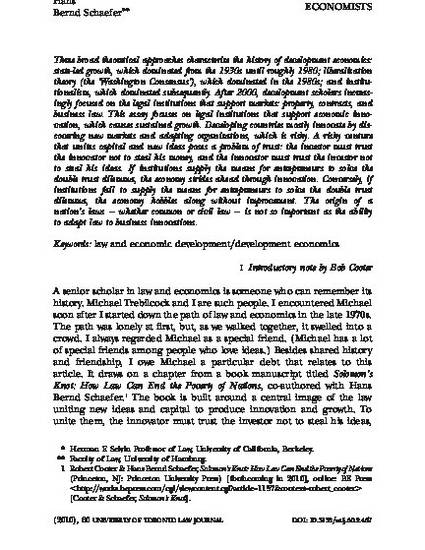
Article
Academic Scribblers and Defunct Ecnomists
University of Toronto Law Journal
(2010)
Abstract
Three broad theoretical approaches characterize the history of development economics:
state-led growth, which dominated from the 1930s until roughly 1980; liberalization
theory (the ‘Washington Consensus’), which dominated in the 1980s; and institutionalism,
which dominated subsequently. After 2000, development scholars increasingly
focused on the legal institutions that support markets: property, contracts, and
business law. This essay focuses on legal institutions that support economic innovation,
which causes sustained growth. Developing countries mostly innovate by discovering
new markets and adapting organizations, which is risky. A risky venture
that unites capital and new ideas poses a problem of trust: the investor must trust
the innovator not to steal his money, and the innovator must trust the investor not
to steal his ideas. If institutions supply the means for entrepreneurs to solve the
double trust dilemma, the economy strides ahead through innovation. Conversely, if
institutions fail to supply the means for entrepreneurs to solve the double trust
dilemma, the economy hobbles along without improvement. The origin of a
nation’s laws – whether common or civil law – is not so important as the ability
to adapt law to business innovations.
Disciplines
Publication Date
Spring 2010
DOI
http://dx.doi.org/10.3138/utlj.60.2.467
Citation Information
Robert D. Cooter and Hans Bernard Schaefer. "Academic Scribblers and Defunct Ecnomists" University of Toronto Law Journal Vol. 60 Iss. 2 (2010) p. 467 - 489 Available at: http://works.bepress.com/robert_cooter/263/
